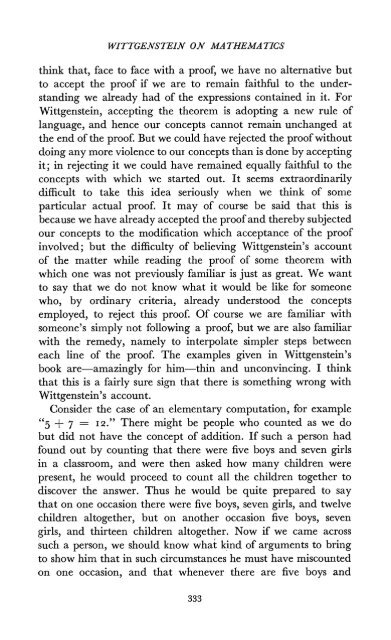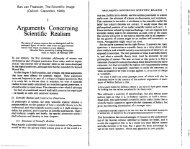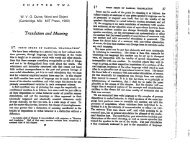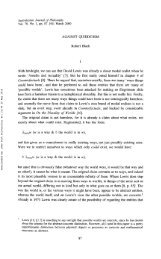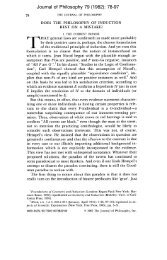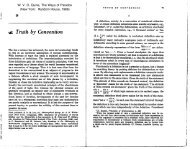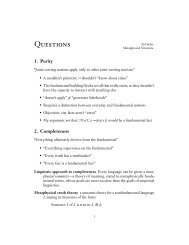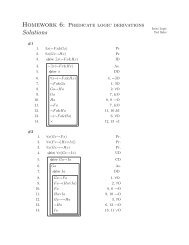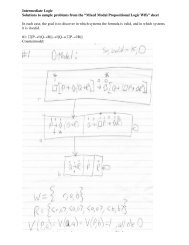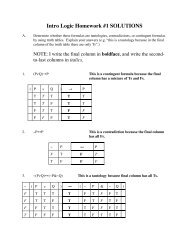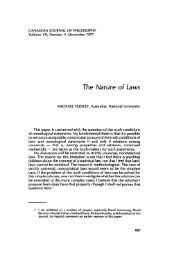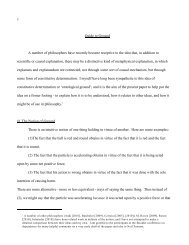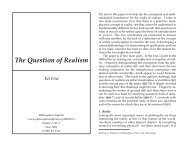Dummett - Wittgenstein's Philosophy of Mathematics.pdf - Ted Sider
Dummett - Wittgenstein's Philosophy of Mathematics.pdf - Ted Sider
Dummett - Wittgenstein's Philosophy of Mathematics.pdf - Ted Sider
Create successful ePaper yourself
Turn your PDF publications into a flip-book with our unique Google optimized e-Paper software.
WITTGENSTEIN ON MA THEMA TICS<br />
think that, face to face with a pro<strong>of</strong>, we have no alternative but<br />
to accept the pro<strong>of</strong> if we are to remain faithful to the under-<br />
standing we already had <strong>of</strong> the expressions contained in it. For<br />
Wittgenstein, accepting the theorem is adopting a new rule <strong>of</strong><br />
language, and hence our concepts cannot remain unchanged at<br />
the end <strong>of</strong> the pro<strong>of</strong>. But we could have rejected the pro<strong>of</strong> without<br />
doing any more violence to oui concepts than is done by accepting<br />
it; in rejecting it we could have remained equally faithful to the<br />
concepts with which we started out. It seems extraordinarily<br />
difficult to take this idea seriously when we think <strong>of</strong> some<br />
particular actual pro<strong>of</strong>. It may <strong>of</strong> course be said that this is<br />
because we have already accepted the pro<strong>of</strong> and thereby subjected<br />
our concepts to the modification which acceptance <strong>of</strong> the pro<strong>of</strong><br />
involved; but the difficulty <strong>of</strong> believing <strong>Wittgenstein's</strong> account<br />
<strong>of</strong> the matter while reading the pro<strong>of</strong> <strong>of</strong> some theorem with<br />
which one was not previously familiar is just as great. We want<br />
to say that we do not know what it would be like for someone<br />
who, by ordinary criteria, already understood the concepts<br />
employed, to reject this pro<strong>of</strong>. Of course we are familiar with<br />
someone's simply not following a pro<strong>of</strong>, but we are also familiar<br />
with the remedy, namely to interpolate simpler steps between<br />
each line <strong>of</strong> the pro<strong>of</strong>. The examples given in <strong>Wittgenstein's</strong><br />
book are-amazingly for him-thin and unconvincing. I think<br />
that this is a fairly sure sign that there is something wrong with<br />
<strong>Wittgenstein's</strong> account.<br />
Consider the case <strong>of</strong> an elementary computation, for example<br />
"5 + 7 = I2." There might be people who counted as we do<br />
but did not have the concept <strong>of</strong> addition. If such a person had<br />
found out by counting that there were five boys and seven girls<br />
in a classroom, and were then asked how many children were<br />
present, he would proceed to count all the children together to<br />
discover the answer. Thus he would be quite prepared to say<br />
that on one occasion there were five boys, seven girls, and twelve<br />
children altogether, but on another occasion five boys, seven<br />
girls, and thirteen children altogether. Now if we came across<br />
such a person, we should know what kind <strong>of</strong> arguments to bring<br />
to show him that in such circumstances he must have miscounted<br />
on one occasion, and that whenever there are five boys and<br />
333


